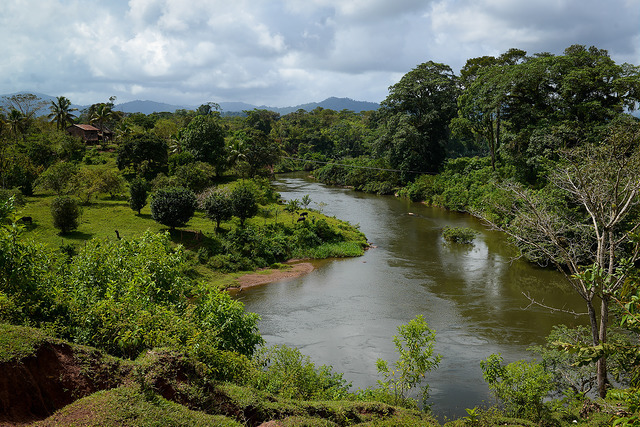5 de septiembre 2017

Children of Exile: The Births “Sowing Hope” in the Camp of Nicaraguan Farmers

PUBLICIDAD 1M
PUBLICIDAD 4D
PUBLICIDAD 5D
“This is part of a new process to unify and facilitate the administrative procedures,” stated Jose Adan Aguerri, COSEP president.

“Lo que se está haciendo el decreto es un proceso que busca unificar y facilitar los procesos administrativos”
Both the President of Nicaragua and the Ministry of the Environment and Natural Resources (MARENA) have maintained silence regarding Presidential Decree 15–2017 that eliminates the requirements for environmental impact studies prior to the execution of projects involving the natural resources.
According to the official decree, it’s part of a process called “Updating of the Environmental Evaluation System for Permissions and Authorizations involving the Sustainable Use of the Natural Resources.” However, the government hasn’t offered any explanation in response to the demands of environmental protection organizations.
The quasi-official version was given by Jose Adan Aguerri, president of COSEP, the Superior Council of Private Enterprise. Speaking as the official voice of private enterprise and of his governmental counterparts, Aguerri explained that all the business organizations have been represented in discussions of this updating, along with governmental institutions such as MARENA (the Ministry of the Environment and Natural Resources), the National Water Authority and the National Forestry Institute.
According to Aguerri, “what we’re doing is designing a new process to unify and facilitate the administrative procedures.” In the absence of any official version, he alleged that they’re not going to stop carrying out environmental impact studies; rather they’re devising a new norm to unify and facilitate the companies’ administrative processes.
Decree threatens the natural resources
When journalists asked Aguerri about the complaints from the environmental protection organizations that they’ve been left out of this process of discussion and negotiation, he stated that he couldn’t answer that question, as it pertained to the government.
“We participated in the discussions as representatives of the private sector. The government has its ties to the other organizations… I have no idea who was invited and who wasn’t, that’s a question for the government,” Aguerri asserted.
Confidencial contacted the office of the Presidency, the Vice Presidency and MARENA, but none of the institutions responded to inquiries on the topic.
Environmental organizations concerned
The environmental protection organizations have expressed their concern, since they feel that with this new set of norms – soon to be published, according to the private enterprise spokesperson – all of the processes will be handled with more leeway.
Victor Campos, director of the Humboldt Center, affirmed that they’re analyzing the decree and that later the organizations belonging to the CocibolcaGroup will publish a statement on the topic. He assured that the government hadn’t eliminated the environmental impact studies, but nevertheless they basically handed the authority over to MARENA to decide on the procedures for the realization of these evaluations.
“The correct interpretation is that they gave the Ministry more discretion. The procedures had been regulated, and now they’ve given them leeway to handle it as they think best. MARENA should present the mechanisms and procedures that they’re going to use,” declared Campos.
The approval of the order occurred in a context in which different environmental organizations and groups from civil society have questioned the recent concessions awarded to mining companies in the country.
In theory, to approve or modernize the System of Environmental Evaluation, diverse sectors of the country such as the environmental or civic organizations should also be consulted. Amaru Ruiz, president of the Fundacion del Rio [River Foundation] confirmed that the Nicaraguan government hadn’t realized any type of consultation, and the matter definitely intrigues the environmental institutions.
“We don’t know what’s behind this decree, nor what affect it’s going to have on the natural resources. What we are certain of is that MARENA is a weakened institution, with little financing and capacity. If they’re carrying out this process to lessen the environmental requirements, then yes, it’s a bad thing. But if it’s to increase them, order them and improve them, then I’d say we’re on a good road,” Ruiz reflected.
Jaime Incer Barquero, scientist and former MARENA minister, feels that with the issuing of this decree, the government is going counter to the efforts being realized on an international level in terms of the preservation of the environment.
The scientist criticized the fact the MARENA has no voice and no vote in the government. In addition, he assured that an institution that accepts and tolerates absurdities like the land invasions into the protected reserves can’t take on something as delicate as the conservation and protection of the natural resources.
“This goes right along with their refusal to sign the Paris Accords. Nicaragua is in a bad predicament because, being a country that is very vulnerable to climate change, it’s being stripped of the resources that could be protected,” finalized Incer Barquero.
Translated by Habana Times
Archivado como:
PUBLICIDAD 3M
Periodista. Investiga temas de medio ambiente, corrupción y derechos humanos. Premio a la Excelencia Periodística Pedro Joaquín Chamorro, Premio de Innovación Periodística Connectas, y finalista del premio IPYS en el 2018.
PUBLICIDAD 3D